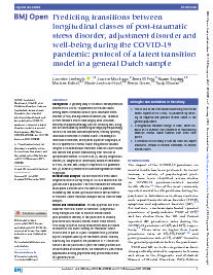Predicting transitions between longitudinal classes of posttraumatic stress disorder, adjustment disorder, and well-being during the COVID-19 pandemic : Protocol of a latent transition model in a general Dutch sample
Background
A growing body of literature shows profound effects of the COVID-19 pandemic on mental health, among which increased rates of posttraumatic stress disorder (PTSD) and adjustment disorder (AD). However, current research efforts have largely been unilateral, focusing on psychopathology and not including well-being, and are dominated by examining average psychopathology levels or on disorder absence/presence, thereby ignoring individual differences in mental health. Knowledge on individual differences, as depicted by latent subgroups, in the full spectrum of mental health may provide valuable insights in how individuals transition between health states and factors that predict transitioning from resilient to symptomatic classes. Our aim is to (1) identify longitudinal classes (i.e., subgroups of individuals) based on indicators of PTSD, AD, and well-being in response to the pandemic and (2) examine predictors of transitioning between these subgroups.
Methods and analysis
We will conduct a three-wave longitudinal online survey-study of n ≥ 2000 adults from the general Dutch population. The first measurement occasion takes place six months after the start of the pandemic, followed by two follow-up measurements with six months intervals. Latent transition analysis will be used for data-analysis.
Ethics and dissemination
Ethical approval has been obtained from four Dutch universities. Longitudinal study designs are vital to monitor mental health (and predictors thereof) in the pandemic to develop preventive and curative mental health interventions. This study is carried out by researchers who are board members of the Dutch Society for Traumatic Stress Studies and is part of a pan-European study (initiated by the European Society for Traumatic Stress Studies) examining the impact of the pandemic in eleven countries. Results will be published in peer-reviewed journals and disseminated at conferences, via newsletters, and media-appearance among (psychotrauma-)professionals and the general public.
Strengths and limitations of this study
• This is one of the first studies examining the mental health impact of the COVID-19 pandemic by focusing on negative and positive mental health in the general population.
• A longitudinal research design is used, which enable us to examine predictors of transitioning between mental health classes over three time points.
• A limitation of this study is that we used self-report measures, instead of clinical interviews, to assess mental health.
Geachte bezoeker,
De informatie die u nu opvraagt, kan door psychotraumanet niet aan u worden getoond. Dit kan verschillende redenen hebben,
waarvan (bescherming van het) auteursrecht de meeste voorkomende is. Wanneer het mogelijk is om u door te verwijzen naar de bron
van deze informatie, dan ziet u hier onder een link naar die plek.
Als er geen link staat, kunt u contact opnemen met de bibliotheek,
die u verder op weg kan helpen.
Met vriendelijke groet,
Het psychotraumanet-team.
In: BMJ Open ; ISSN: 2044-6055 | 12 | 1 | january | e055696
https://www.medrxiv.org/content/10.1101/2021.08.30.21262819v1


